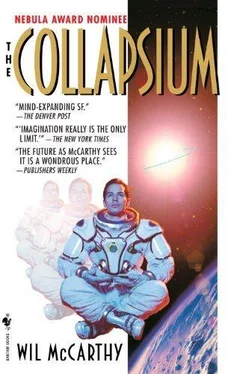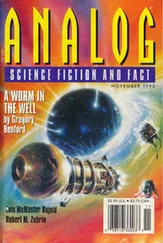The view above them was still of Sol: a bright star among the many stars, none of them moving. But at the edges of the view, just barely visible, was a lighted red circle in a curve of well-metals. It flicked off and then on again as Bruno watched. Not part of their own ship; it was the only sign of the massive station hulking below them.
“Ship,” Muddy said, “display a schematic of the station, including yourself upon it, and clearly indicate the positions of all living persons.”
Obligingly, the brass plaque erased itself and became instead a plate of holographic glass, behind which a little grapple station appeared, as if modeled in translucent brown plastic. Two dots of brightly contrasting pink appeared in one lobe of the structure—Bruno and Muddy in the Sabadell-Andorra . A third dot hovered nearby, perhaps fifty meters away.
“Okay, I have you on scope,” Deliah said. “The nearest air lock suffered minimal damage in the accident—air leakage shouldn’t be a major problem if you mate there.”
“Mate?” Bruno asked stupidly.
Muddy slapped himself on the forehead, not playfully or symbolically but hard , as if he meant to raise a welt. “Little gods, I’m so stupid! So stupid!”
“We have no airlock,” Bruno said, echoing the obvious. “Steady, Brother—I didn’t think of it either. We’re not the most brilliant of sailors, you and I. Deliah, there’s a problem. Have you any sort of spacesuit to climb into?”
“No,” she said, “nothing like that. All the faxes are down. Do I hear you correctly? If you’re airlock-free, I don’t see how a spacesuit would help. The vacuum would kill you both the moment I opened your hatch.”
“Indeed,” Bruno agreed ruefully. “We have a door , and an ample supply of oxygen, but that will do us little good if we must suffocate to admit you. An idiotic quandary. Let’s think on this a moment. My humblest apologies, madam.”
“Can you fax yourself into storage for a few minutes, while the hatch is opened and closed?” Deliah asked.
“Alas, no, our fax is much too small to admit a person. Let me think about this.”
Muddy had, of course, started crying again, but presently his eyes brightened, his snuffling quieted, and his hands lashed out for the control panel above him.
“An idea?” Bruno asked, feeling startled.
“Indeed, yes. Deliah, move as far away from us as you can. Can you seal yourself off with an independent air supply?”
Her snort of amusement was unmistakable. “You overestimate the conditions here, de Towaji.”
“I’m Muddy.”
“Oh. Well, I can put some distance between us, but it’s all one crumpled volume. Is the danger really any greater if I’m close?”
Muddy considered. “I suppose not, actually.”
“I’ll only go a little ways, then.”
“Stay clear of the walls, at least.”
The floor had begun to make a new noise—a kind of low, sizzling hiss.
“What are you doing?” Bruno asked. Well, demanded, actually, and then immediately felt bad for it. He’d been telling Muddy all along to act like a man, to use the brains and initiative he’d been born with, to be helpful rather than helpless, and yet here he was getting unnerved and suspicious the first time it actually happened. He supposed it was another response from humanity’s deep wiring: Muddy had acted subservient for long enough to place himself “beneath” Bruno in some imaginary hierarchy. And now he was… What? Exceeding that role? Getting uppity? Was Bruno entitled, in this age of self-repair and self-reconstruction, to blame him for that, and then excuse his own behavior as a quirk of evolution? Surely not.
These things , Muddy’s voice reminded him, aren’t so easily undone as you seem to imagine . Perhaps it was like the wiring for pain: subtle, pervasive, intimately tied to vital functions. But was that an excuse? Goodness, if Bruno couldn’t treat himself with dignity…
“I’m sorry,” he said to Muddy’s cringing form, with as much sincerity as he could muster. “Please proceed.”
Slowly, Muddy uncringed himself and moved his hands back toward the controls. “It’s a chemical reaction. A’s-s-series of them, actually.”
“Ah!” Bruno said, grasping the idea at once. The hull’s outer layer was wellstone; it could be programmed into all manner of absurdly reactive forms that would decompose— atom by atom—the absurdly nonreactive substance of the grapple station’s wellstone hull. Such reactions could be timed in waves, so that each atom of silicon substrate, once liberated, could be carried away in the chemical equivalent of a bucket brigade. And at the edges and interfaces, the two hulls could be pseudochemically merged , to keep the air from leaking out around the sides. The Sabadell-Andorra was melting its way through the defenses of the runaway station, melting through into its cozy, air-filled interior. Already, the sizzling sound had climbed half a meter up the sides of the Andorra’s barrel hull.
“My God!” Bruno exclaimed, and if he weren’t secured and awkwardly tilted in his leather couch, he’d have leaped to his feet to grasp Muddy’s hand and pump it. “How brilliant! What a tidy solution that is. And quick! Why, it took you hardly any time at all.”
“Careful, sir,” Muddy warned. “You endanger your modesty. To claim me as part of yourself, then praise my brilliance? It’s mightily suspicious.” His voice was partly sour, partly sarcastic, partly amused and wry. But he seemed to appreciate the compliment just the same. He relaxed visibly, his frame filling out a little as his muscles slumped and his chest expanded.
“Oh, piffle,” Bruno answered, in much the same tone. But he took the hint, and declined to praise himself further. “How long until we can open the door?”
“Another minute.”
Deliah’s voice broke through again. “Holy Philadelphia! My station! My beautiful station, what are you doing to the hull of my beautiful station?”
She, too, sounded amused. What a jolly band of jokers they were up here, ten thousand million kilometers above the sun. Bruno supposed it was a reasonable defense mechanism, given the chaos below and the impossibility of their intervention there, at this particular moment. He thought of Tonga, the cliffs of Fua’amotu washed away, and felt guilty for his humor.
“I see the door,” Deliah said in a bleaker, more serious tone. “It’s about halfway in. No signs of air leakage yet. For an impromptu solution, this seems to be working rather well.”
“You know,” Muddy said, “technically we could do the same thing to our own hull: pull the iron aside bit by bit as a temporary measure, and make a wellstone door anywhere we like. Not even a door, a semipermeable membrane. I suppose fighting your way against the air-pressure gradient might be difficult, but we could compensate by… Well, hmm.”
“It hardly matters,” Deliah said. “Your real hatch is almost through. Just stay clear of that cladding! You do realize I’d never approve this as a safe operating procedure. You could so easily kill us all right now…
“All right, another two centimeters and it looks like the hatch will open. And… it’s… there. Can you go a little further inward, just to be safe? Good. Can you see this? It looks perfectly clear from where I’m standing. Can you open the door?”
“Indeed,” Bruno said.
But it was Muddy who was closest, and so he was the one who unstrapped himself, slid down the now-diagonal floor, and threw the latches. There was a huffing noise as the equalization valves kicked in. Bruno’s ears popped; the pressure was lower on Deliah’s side.
Читать дальше












